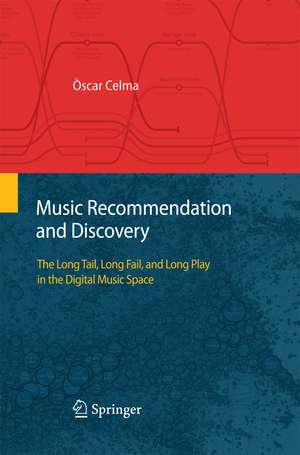Music Recommendation and Discovery: The Long Tail, Long Fail, and Long Play in the Digital Music Space
Autor Òscar Celmaen Limba Engleză Paperback – 15 oct 2014
| Toate formatele și edițiile | Preț | Express |
|---|---|---|
| Paperback (1) | 328.27 lei 43-57 zile | |
| Springer Berlin, Heidelberg – 15 oct 2014 | 328.27 lei 43-57 zile | |
| Hardback (1) | 328.09 lei 43-57 zile | |
| Springer Berlin, Heidelberg – 5 sep 2010 | 328.09 lei 43-57 zile |
Preț: 328.27 lei
Preț vechi: 410.34 lei
-20% Nou
Puncte Express: 492
Preț estimativ în valută:
62.81€ • 65.76$ • 51.97£
62.81€ • 65.76$ • 51.97£
Carte tipărită la comandă
Livrare economică 07-21 aprilie
Preluare comenzi: 021 569.72.76
Specificații
ISBN-13: 9783642439537
ISBN-10: 3642439535
Pagini: 212
Ilustrații: XVI, 194 p.
Dimensiuni: 155 x 235 x 15 mm
Greutate: 0.3 kg
Ediția:2010
Editura: Springer Berlin, Heidelberg
Colecția Springer
Locul publicării:Berlin, Heidelberg, Germany
ISBN-10: 3642439535
Pagini: 212
Ilustrații: XVI, 194 p.
Dimensiuni: 155 x 235 x 15 mm
Greutate: 0.3 kg
Ediția:2010
Editura: Springer Berlin, Heidelberg
Colecția Springer
Locul publicării:Berlin, Heidelberg, Germany
Public țintă
GraduateCuprins
The Recommendation Problem.- Music Recommendation.- The Long Tail in Recommender Systems.- Evaluation Metrics.- Network-Centric Evaluation.- User-Centric Evaluation.- Applications.- Conclusions and Further Research.
Textul de pe ultima copertă
With so much more music available these days, traditional ways of finding music have diminished. Today radio shows are often programmed by large corporations that create playlists drawn from a limited pool of tracks. Similarly, record stores have been replaced by big-box retailers that have ever-shrinking music departments. Instead of relying on DJs, record-store clerks or their friends for music recommendations, listeners are turning to machines to guide them to new music.
In this book, Òscar Celma guides us through the world of automatic music recommendation. He describes how music recommenders work, explores some of the limitations seen in current recommenders, offers techniques for evaluating the effectiveness of music recommendations and demonstrates how to build effective recommenders by offering two real-world recommender examples. He emphasizes the user's perceived quality, rather than the system's predictive accuracy when providing recommendations, thus allowing users to discover new music by exploiting the long tail of popularity and promoting novel and relevant material ("non-obvious recommendations"). In order to reach out into the long tail, he needs to weave techniques from complex network analysis and music information retrieval.
Aimed at final-year-undergraduate and graduate students working on recommender systems or music information retrieval, this book presents the state of the art of all the different techniques used to recommend items, focusing on the music domain as the underlying application.
In this book, Òscar Celma guides us through the world of automatic music recommendation. He describes how music recommenders work, explores some of the limitations seen in current recommenders, offers techniques for evaluating the effectiveness of music recommendations and demonstrates how to build effective recommenders by offering two real-world recommender examples. He emphasizes the user's perceived quality, rather than the system's predictive accuracy when providing recommendations, thus allowing users to discover new music by exploiting the long tail of popularity and promoting novel and relevant material ("non-obvious recommendations"). In order to reach out into the long tail, he needs to weave techniques from complex network analysis and music information retrieval.
Aimed at final-year-undergraduate and graduate students working on recommender systems or music information retrieval, this book presents the state of the art of all the different techniques used to recommend items, focusing on the music domain as the underlying application.
Caracteristici
Starts with a formalization of the general recommendation problem Presents the pros and cons of most-used recommendation approaches, with a focus on the music domain Combines elements from recommender systems, complex network analysis, music information retrieval, and personalization Emphasizes "user's perceived quality" versus "system's predictive accuracy" Includes supplementary material: sn.pub/extras







